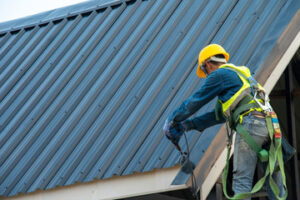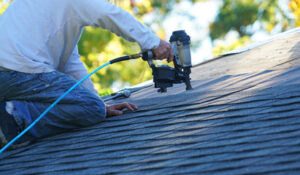Commercial roofing contractors are essential in providing high-quality installation and maintenance services. They have specialized training and experience in installing a wide range of roof materials including asphalt shingles, metal tiles, and clay tiles.

They can also advise clients on the best roof system for their needs and budget. A quality contractor will use top-rated materials that are backed by the manufacturer. Contact Pikesville Roofer for professional help.
Whether you’re hiring for commercial or residential roofing, you want to be sure that the person you hire is qualified and has experience. Ask about previous projects and reviews, as well as any certifications they have. You can also check to see if they’re licensed in your state. A reliable contractor will ensure quality workmanship, adherence to safety regulations, and efficient completion of your project.
Commercial roofers install, repair, and replace shingles, metal, rubber, and single-ply membranes. They use a variety of tools including tape measures, hammers, hand drills, and power tools. They must also be able to set up scaffolding for safe access to the roof. They apply alternate layers of roofing paper, cut roofing papers with knives, and maintain a safe working environment.
In some states, you need a license to be a commercial roofer. For example, in New Mexico you need to pass a trade exam and a business and law exam before being licensed. In Idaho, you need four years of supervisory work experience as a journeyman, foreman, or supervisor before being eligible to take the exam.
Another important qualification is physical ability. Roofing work is physically demanding and can involve lifting heavy materials in awkward positions for hours at a time. It’s also common for roofers to work in extreme heat or cold, so it’s essential that they are able to adapt to these conditions.
Additionally, commercial roofers need to be skilled in repairing the types of roofing systems they specialize in. If they don’t have the skills necessary, it can lead to costly mistakes and delays in completing your project.
In addition to roofing skills, a commercial roofer should have experience with various materials and building types. Choosing a company that has a wide range of experience can help you avoid issues down the road.
It’s also a good idea to choose a company that offers green roofing services, which use plant material on the roof to improve air quality, manage stormwater, and provide insulation. In addition to these benefits, a green roof can reduce energy costs and contribute to LEED certification.
Experience
A commercial roofer can work on a variety of different types of buildings and roofing materials. This type of work requires a lot of field experience in order to gain the necessary skills for working on and repairing different types of roofing systems. Some commercial roofers specialize in a particular type of material or building, such as metal roofs or shingle roofs. Others focus on a particular roof system, such as PVC or EPDM, and use their knowledge of these specific systems to install and repair them.
Choosing the right roofing contractor can make or break the success of a roofing project. It is important to ask commercial roofers about their previous projects and what role they played in each one. This will help you gauge their level of expertise and whether or not they are qualified for the job at hand.
In addition to the roofing work itself, commercial roofers should have a good understanding of the safety issues involved in this kind of construction. They must be able to handle the obvious dangers of roof heights, skylights and overhead cranes, but they should also have a clear understanding of how to deal with the less-obvious hazards, such as ice dams and structural damage.
A reputable commercial roofer should also have a solid understanding of the different materials used in the industry and their benefits and drawbacks. They should not be tempted to cut corners by using low-quality products that may cost more in the long run. In addition, they should be able to advise customers on which products are best for their needs and budgets.
When assessing the potential of a commercial roofer, it is also important to look at their customer service. They should be able to answer all your questions clearly and concisely, and they should be able to set realistic expectations about the length of time that a job will take.
In terms of managing the client, Skujins says that he finds residential clients to be more demanding than commercial ones. He also notes that commercial clients are more likely to trust that warranties will protect them and thus spend less time worrying about the aesthetic details of the work.
Licensing
Commercial roofers work on high-rise buildings and other commercial properties, as well as residential homes. They are responsible for inspecting, replacing, and repairing the roofs of these structures. They need to be fully licensed and insured to ensure the safety of their team members. They should also have the physical strength and endurance to safely handle their job duties. Choosing an unlicensed roofing professional could result in subpar work or legal issues, so always verify your contractor’s credentials before hiring them.
Some states have licensing requirements for roofing professionals, while others defer to local jurisdictions. This is because state borders can house vastly different communities, from crowded urban areas to sprawling suburbs and rural farmland. Additionally, the cost of roofing can vary drastically between regions. For example, the cost of a new roof for a large office building may be significantly higher than the cost for a small home. This means that roofing contractors need to have a wider range of skills to work on different projects.
In Oklahoma, for example, residential and commercial roofers are required to be licensed. Applicants must pass state law and business exams, as well as a trade exam. They must also show proof of workers’ compensation coverage and a surety bond. Likewise, in Nebraska, all contractors must register with the state’s Construction Industries Board. Those who want to work on both residential and commercial roofs must get a general license, while those who only plan to work on residential roofs must obtain a limited license.
Roofers who are licensed in one state can often work in other states without additional requirements. However, this is not always the case, and local regulations should be reviewed before pursuing licensing in a new location.
Skujins says that it’s worth looking for a local roofing organization to join. These organizations can connect you with other roofers in the area and provide educational resources. He also recommends asking prospective roofing contractors for references from previous jobs. This can help you gauge the quality of their work and customer service. It can also be helpful to learn about the types of insurance that they have in place, as these may impact their pricing structure.
Insurance
A commercial roofer must carry general liability insurance that protects against property damage and personal injury. It’s important for building owners to request proof of this coverage from contractors before starting a project. It’s also a sign of professionalism and reliability. It shows that the contractor has a strong understanding of the industry and is prepared for unforeseen circumstances. In addition, it may help to negotiate a higher limit for the policy, which provides more protection in the event of a significant loss.
Depending on the scope of your roofing projects, you may need additional types of insurance. For example, equipment breakdown insurance covers costs to repair or replace tools and machinery that break down or are damaged while in use. It’s usually provided as an add-on to a general business policy. If you have employees, workers’ compensation is required by law in most states. It pays for medical expenses, disability, and death benefits if an employee is injured on the job. Depending on the state, it may also cover legal fees if an employee sues over a work-related incident.
Errors and omissions insurance (professional liability) is another important type of insurance for roofing professionals. It helps pay for the legal defense and potential settlements or judgments if a client claims that you’ve made errors in your work, even if the claim doesn’t have merit. It’s also possible that a customer could accuse you of libel or copyright infringement through your advertising and marketing materials.
Commercial auto insurance, or business auto insurance, is necessary for roofing companies that use cars and trucks to transport equipment and supplies. It’s different from personal auto insurance in that it covers vehicles that are used for business purposes and not just owned by the company. It can also cover rented and borrowed vehicles.
Other types of insurance that roofing contractors might consider include commercial umbrella insurance, workers’ compensation, and crime insurance. A surety bond is not technically an insurance policy, but it’s often included in a roofing contractor’s portfolio of policies. It provides a financial guarantee that the contractor will complete a project according to specifications.

